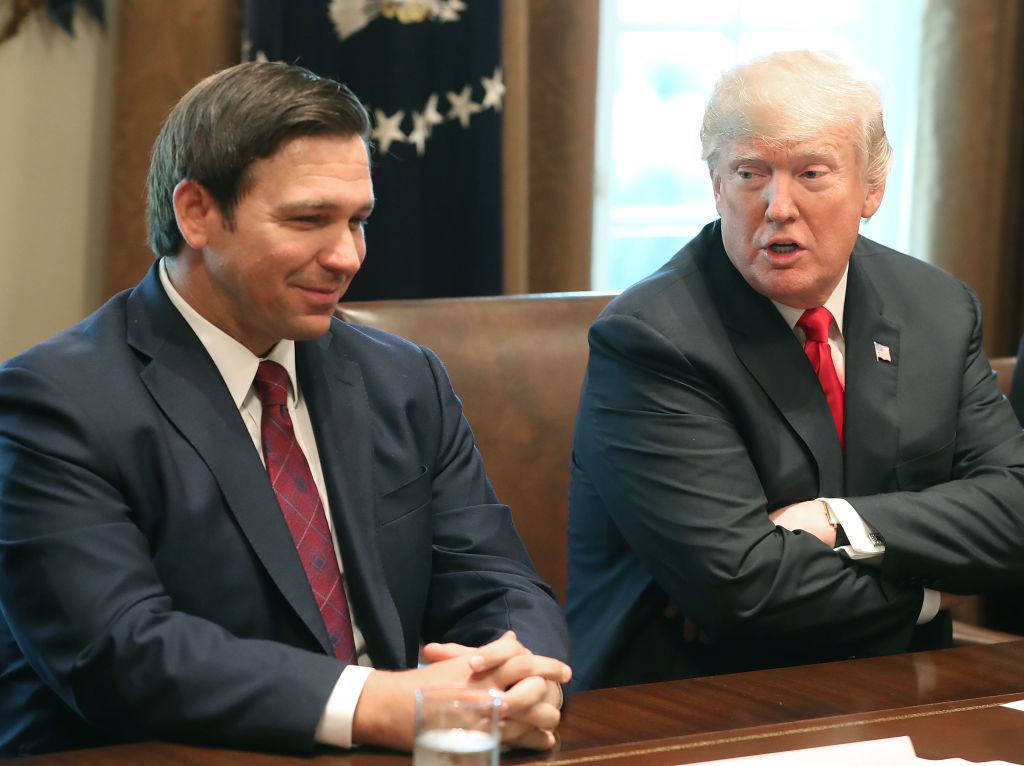Last week, Florida governor Ron DeSantis took two big steps to solidify his popularity with the Republican base, not only in his home state but across the nation.
First, he won the hearts and minds of conservative voters and many independent parents by passing a law that prevents teachers from discussing sensitive topics of gender and sexual orientation with young students (grades three and under). Second, he confronted and defeated one of Florida’s largest and most influential employers, Disney World, on a vital issue. He stripped Disney of its special privilege to govern the vast territory it owns near Orlando.
Both moves are popular in their own right — the first with parents, the second with Republican voters and perhaps others. That popularity is important, but commentators have missed the subtext, why those battles matter so much for DeSantis’s political prospects. What his legislative victories demonstrate is that DeSantis is willing to fight hard against formidable opposition on high-profile issues, including cultural issues. That is exactly what Republican voters want today.
The key word here is fight. The go-along-to-get-along days of Mitt Romney and Jeb Bush are dead and buried. The undertaker was Donald Trump. His eagerness to take on those fights has been central to his success. DeSantis is showing he is just as willing. In fact, he’s trying to show that, like Trump, he is not just willing but eager. He relishes the battles with Hollywood leftists, teachers’ unions, woke corporations, and federal bureaucrats. And he wants to show he can win those fights.
DeSantis’s victories put him at the forefront of his party on a theme that really matters to Republican voters, and to many independents as well. They don’t think K Street lobbyists, unions, Hollywood celebrities, federal bureaucrats, and big corporations are on their side. And, except for the lobbyists (who go wherever the money is), they know these groups are all firmly attached to the Democratic Party. Republican voters want a leader who will confront these entrenched groups — not reluctantly but eagerly — and beat them. That’s exactly what DeSantis showed them last week.
He’s done it before. Remember, he ended mask mandates in Florida over the opposition of Joe Biden, Anthony Fauci and the Centers for Disease Control. The mainstream press ridiculed him; one journalist even calling him a “mass murderer.” Wrong. Florida’s health outcomes have been about the same as other states that enforced the mandates, while imposing a much lower cost on workers, small businesses, tourists, and school children.
DeSantis is also helped by another vital issue: his state’s vigorous growth. Florida’s economy and population have both risen rapidly thanks to zero state income taxes and a friendly regulatory environment. The best evidence of that success is the tidal wave of new residents arriving from New England, New York, New Jersey, and Pennsylvania, all states with high taxes and crippling regulations, all governed by Democrats. People are voting with their U-Haul trailers.
DeSantis has also proven he can win elections in a purple state. He was elected in a tough race, defeating a popular African-American opponent. He is expected to win reelection easily this year. He’s also helped turn his state increasingly Republican in both local and national contests.
What stands in DeSantis’s way of winning the Republican nomination in 2024? Only Donald Trump.
The former president is still immensely popular with the Republican base, despite his bitter recriminations about the 2020 election. Trump not only refuses to acknowledge that he lost, he refuses to support any Republican candidate who doesn’t agree. He even rescinded his support for one candidate who said that Republicans should focus on 2022, not 2020.
Trump’s stance on 2020 may appeal to hardcore believers, but most voters are focused on today’s issues, not yesterday’s. That’s one of the most secure findings in years of research on elections. But that could yet be overridden in primary elections, where turnout is slim and true believers are most likely to vote. And in primary after primary, Trump is forcing candidates to return to the last presidential election and away from pressing issues like inflation, immigration, and crime, which are all winners for Republicans in the general election.
Still, primary candidates cannot ignore Trump. He is the single most important figure in the party, and his endorsement was absolutely crucial in 2016, 2018 and 2020 primaries. The question is whether he still retains that outsized influence in 2022. His biggest test will come in Ohio, where he endorsed J.D. Vance, and Pennsylvania, where he endorsed Dr. Mehmet Öz. Those states are vital to a Republican presidential victory in 2024, and there are serious primary contests in both this year.
Trump gives every indication he plans to run in 2024. The question is whether DeSantis dares to run against him. The dangers for the Florida governor are obvious: he could lose or win only a Pyrhhic victory, alienating the Trump voters he needs in the general election. Anyone who runs against Trump is sure to face a brutal, full-scale attack.
DeSantis won’t have to make that decision until 2023. But his victories last week put him in a far stronger position — if he can make it past Donald Trump.

























